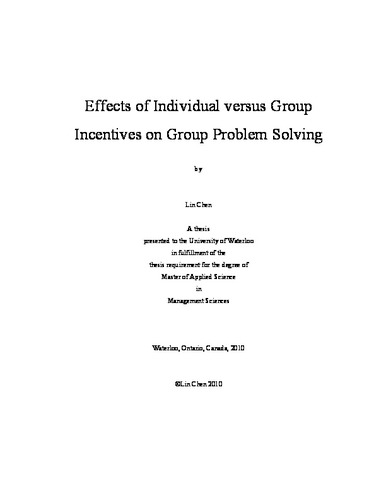| dc.description.abstract | Organizations today face complex problems requiring individuals to work in groups to develop insightful solutions efficiently through coordination, sharing, and integration of distributed knowledge. However, very little research has investigated group problem solving, specifically in terms of incentives and problem structure.
This research uses laboratory experiments to investigate the effects of individual versus group goal conflict on collaborative behaviour and performance in group problem solving process. The experiments study 4-person problem solving groups, in which the group solution emerges through coordination and information sharing. The design of the experiment is a 3 by 3 design with two factors, incentive and task structure. Experiments manipulated the relative weights of individual and group rewards using three ratios (0:100, 50:50, 100:0). Three experimental tasks differing in structure were used to investigate the incentive conflict effect on different kind of problems; in particular, problems containing detours and requiring restructuring. One-hundred and sixty-four undergraduate students participated in this study.
The group problem solving process is viewed as a process towards increased structural balance based on Heider’s balance theory. This method captures both incremental search and cognitive restructuring during the problem solving process.
Results report the effects of group versus individual goal conflict on group performance and behaviour. Results show that incentive influenced group performance and behaviour by affecting strategies groups used to approach the problem. Individual incentive encouraged the group to focus on the solution state while group incentives encouraged random exploration, and this difference is most significant under the complex problem structure. Results also show that task structure influenced group performance and behaviour by varying the amount of incremental search and restructuring required to solve the problem. Individual incentive weakened difference on performances among three problem structures, while group incentive amplified differences on performance and behaviour among three problem structures. | en |

